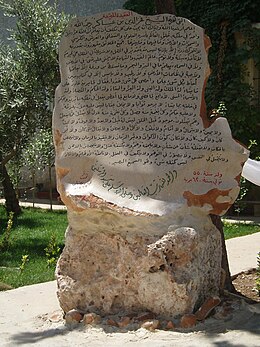Abu al-Walid al-Baji أبو الوليد الباجي | |
|---|---|
| Title | Al-Ḥāfiẓ |
| Personal | |
| Born | 1013[1] |
| Died | 1081 (aged 67–68)[1] |
| Religion | Islam |
| Era | Islamic Golden Age |
| Region | Al-Andalus |
| Denomination | Sunni |
| Jurisprudence | Maliki |
| Creed | Ash'ari[2][3] |
| Main interest(s) | Fiqh, Hadith, Islamic theology (kalam), Poetry |
| Occupation | Scholar, Jurist, Muhaddith, Theologian, Poet |
| Muslim leader | |
Influenced | |
| Part of a series on |
| Ash'arism |
|---|
 |
| Background |
Abu al-Walid al-Baji, full name Sulayman ibn Khalaf ibn Saʿd (or Saʿdun) ibn Ayyub al-Qadi Abu al-Walid al-Tujaybi al-Andalusi al-Qurtubi al-Baji al-Tamimi al-Dhahabi al-Maliki (28 May 1013 – 21 December 1081), was a Sunni scholar from Beja in al-Andalus. He was an eminent Mālikī jurist (faqih), hadith master (muhaddith), theologian (mutakallim), poet and a man of letters. He was an accomplished debater, prolific writer in numerous scientific works and was a meticulous scholar whose high calibre of knowledge and religious merit are widely acknowledged.[4] He and Ibn Ḥazm were "the two most important literary figures in eleventh-century al-Andalus".[5]
- ^ a b Camilla Adang, Maribel Fierro, Sabine Schmidtke, Ibn Ḥazm of Cordoba: The Life and Works of a Controversial Thinker (Brill Publishers, 2012), p 5. ISBN 9004243100
- ^ Yassin Ghanem Jassim al-Aridi (2024). Classes of Ash'aris, notables of the people of the Sunnah and the community. Dar al-Kotob al-'Ilmiyya. p. 119-120. ISBN 9786144962350.
- ^ Gibril Fouad Haddad (2 May 2015). The Biographies of the Elite Lives of the Scholars, Imams & Hadith Masters. As-Sunnah Foundation of America. p. 164.
Imam al-Subki mentions him among those who followed the school of Imam Ashari in Beliefs & Doctrine (Aqidah) along with Abu al-Walid al-Baji, Abu al-Hasan al-Qabisi, Abu al-Qasim bin Asakir, Abu al-Hasan al-Muradi, Abu Sad bin al-Samani, Abu Tahir al-Silafi, Qadi Iyad and Al-Shahrastani
- ^ Gibril Fouad Haddad (2 May 2015). "Abu al-Walid al-Baji (403 AH – 474 AH, 71 Years Old)". The Biographies of the Elite Lives of the Scholars, Imams & Hadith Masters. As-Sunnah Foundation of America. pp. 183–184.
- ^ Diego Sarrió Cucarella (2012), "Corresponding Across Religious Borders: Al-Bājī's Response to a Missionary Letter from France", Medieval Encounters, 18: 1–35, doi:10.1163/157006712X63454= (inactive 2024-11-06)
{{citation}}: CS1 maint: DOI inactive as of November 2024 (link).